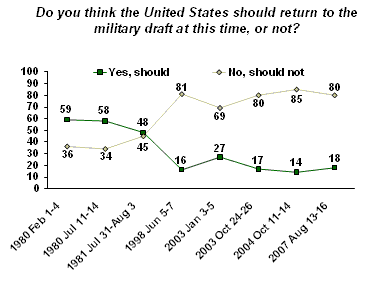GALLUP NEWS SERVICE
PRINCETON, NJ -- With U.S. troop levels in Iraq at the highest point at the same time the military is fighting a war against terrorists in Afghanistan, there are concerns that the United States military is stretched too thin. As a result, some military experts have speculated that the United States may need to reinstitute the military draft so that it can maintain adequate forces for its military operations. Indeed, some elected representatives, including U.S. Reps. John Murtha and Charles Rangel, have come out in favor of the draft. However, a recent Gallup Poll finds that Americans are overwhelmingly opposed to the idea of returning to the military draft.
According to an Aug. 13-16 Gallup Poll, just 18% of Americans think "the United States should return to the military draft at this time," while 80% do not. That low level of support is similar to what Gallup has found throughout the Iraq war. Prior to the beginning of the war, in January 2003, a slightly higher percentage of Americans (27%) favored a return to the draft, but still well below a majority.

Americans have not always been against reinstituting the draft, which was stopped in 1973. In 1980, President Jimmy Carter discussed the possibility of resurrecting the draft and reinstituted the Selective Service registration requirement for young men following the Soviet invasion of Afghanistan. At that time, a majority of Americans favored reinstituting the draft. Support had dropped below the majority level by the summer of 1981, after Ronald Reagan had defeated Carter in his re-election bid.
Gallup did not ask the question again until 1998, when it found high levels of opposition to reinstituting the draft that are similar to today's levels. The higher levels of support in the early 1980s may have been a reflection of the international problems facing the United States at that time (the Cold War, the Iran hostage crisis), but also could have been because the draft had been in existence less than a decade earlier, and thus was a more familiar program to Americans. Thus, it would not have been as dramatic a change to reinstitute the draft in 1980 after a seven-year absence as it would be now, more than 30 years since the United States last drafted young Americans into military service.
No major subgroup of Americans favors a return to the military draft. However, there are variations in support by age, gender, and military service, with older Americans, men, and those who have served in the military most likely to support a draft:
- Only 10% of Americans under the age of 50 think the United States should return to the draft, compared with 25% of those between the ages of 50 and 64 and 38% of those aged 65 and older. This may reflect that older Americans are familiar with the draft program from when it was in existence.
- Twenty-three percent of men and 14% of women favor the reinstitution of the draft.
- Veterans (42%) are three times more likely than non-veterans (14%) to believe the United States should reinstitute the draft.
While veterans are predominantly male and tend to be older in age, age and gender each have independent effects on support for the draft when taking into account respondents' veteran status.
Survey Methods
These results are based on telephone interviews with a randomly selected national sample of 1,019 adults, aged 18 and older, conducted Aug. 13-16, 2007. For results based on this sample, one can say with 95% confidence that the maximum error attributable to sampling and other random effects is ±3 percentage points. In addition to sampling error, question wording and practical difficulties in conducting surveys can introduce error or bias into the findings of public opinion polls.
49. Do you think the United States should return to the military draft at this time, or not?
|
|
Yes |
No |
No |
|
% |
% |
% |
|
|
2007 Aug 13-16 |
18 |
80 |
2 |
|
|
|
|
|
|
2004 Oct 11-14 |
14 |
85 |
1 |
|
2003 Oct 24-26 |
17 |
80 |
3 |
|
2003 Jan 3-5 ^ |
27 |
69 |
4 |
|
1998 Jun 5-7 |
16 |
81 |
3 |
|
1981 Jul 31-Aug 3 |
48 |
45 |
7 |
|
1980 Jul 11-14 |
58 |
34 |
7 |
|
1980 Feb 1-4 |
59 |
36 |
5 |
|
^ Asked of a half sample. |
|||
